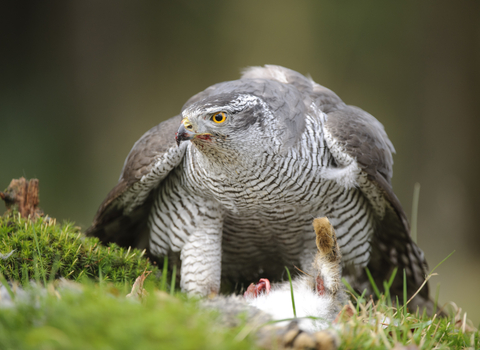
Goshawk ©Andrew Mason
Goshawk
Known as the phantom of the forest, goshawks can fly through the trees at up to 40km per hour as they hunt birds and small mammals.
Scientific name
Accipiter gentilisWhen to see
January to DecemberSpecies information
Category
Statistics
Length: 49-56cm (male). 58-64cm (female)Wingspan: 90-105cm (male), 108-120cm (female)
Weight: 850g (male), 1.5kg (female)
Average lifespan: 7 years
Classified in the UK as Green under the Birds of Conservation Concern 5: the Red List for Birds (2021). Protected in the UK under the Wildlife and Countryside Act, 1981.
Habitats
About
This powerful bird of prey was persecuted to extinction in the UK in the late 19th century, but escaped and deliberately released falconry birds launched a population recovery in the late 1960s. Nesting in forests and large woods, they are most easily seen in late winter and spring, when pairs perform spectacular aerial displays over their woodland territories.How to identify
The goshawk is similar to the sparrowhawk, but much larger. In flight they appear powerful, with broad wings and a long, rounded tail (more square-cut in sparrowhawk). Up-close they show thick legs and a white line above each orange-red eye. Females, the size of a buzzard, have slate-grey upperparts and whitish underparts barred grey, whilst males are smaller, with blue-grey upperparts. Juvenile birds have striped rather than barred underparts.Distribution
Found across the UK but often localised. Population strongholds in Wales, northern England, the New Forest and southern and eastern Scotland.In our area
Goshawks on the Isle of man are rare migrants.
Did you know?
Although we consider goshawks to be birds of the forest, in other parts of Europe they can be found in urban settings, perching on street lights and catching feral pigeons.Goshawks on the Isle of man are rare migrants.
